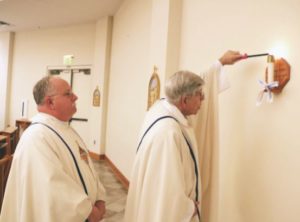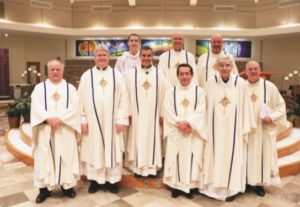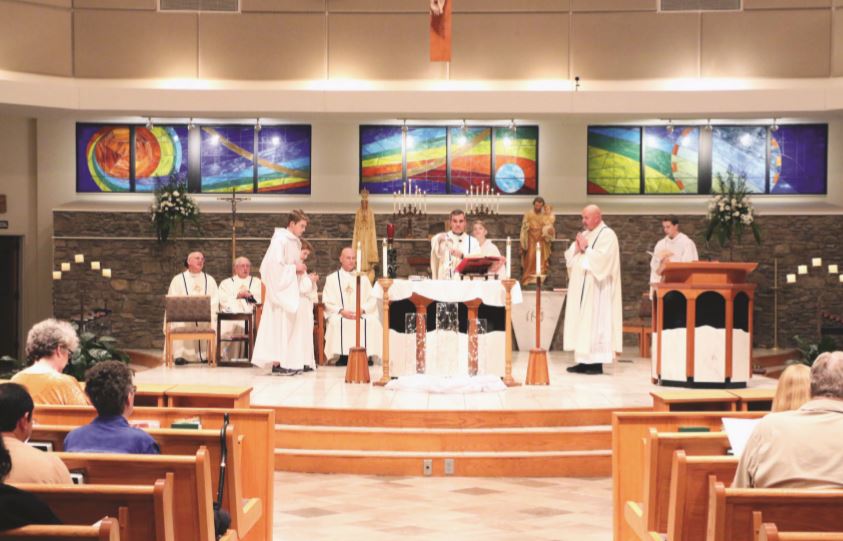Our Lady of Fatima Parish marks the 20th year since its ‘new’ church was dedicated in Blount County
By Bill Brewer
A special Mass celebrated March 11 to mark the 20th anniversary of the dedication of Our Lady of Fatima’s present church, parish hall, and offices, was as much a testament to the future as it was an homage to the past.

Father Joe Brando lights a candle where the wall was anointed when Our Lady of Fatima’s church was built. Joining him is Father Bill McNeeley. Both priests served at Our Lady of Fatima.
Father Peter Iorio, pastor of Our Lady of Fatima, welcomed Diocese of Knoxville priests who previously served at the Alcoa parish. Father Joe Brando, Father Patrick Resen, Father John O’Neill, and Father Bill McNeeley concelebrated the Mass, held 20 years to the day since the church’s dedication. Also concelebrating was Father Andrés Cano, associate pastor of Our Lady of Fatima.
Deacon Bill Jacobs served as deacon of the Word, and Deacon Scott Maentz served as deacon of the Eucharist.
For the Mass readings, Father Iorio selected the same readings from the dedication Mass held on March 11, 2000: Nehemiah 8:1-4a, 8-10 and 1 Corinthians 3:9-13, 1617. Our Lady of Fatima’s full choir provided the music liturgy, and parish youth also participated in the celebration.
Father Iorio also had Fathers McNeeley, O’Neill, Brando, and Waraksa light candles on the walls of the nave where then-Bishop Joseph E. Kurtz consecrated the walls during the 2000 dedication.
In his homily, Father Waraksa recalled his first visit to the newer church just before its dedication, pointing out that soon after the visit he would become pastor. In describing the then-recently developed campus, he reminded the congregation that Christ is the foundation of Our Lady of Fatima, just as He is the foundation of every Christian church.
“Christ wasn’t here when this church was built, or when most churches were built. In fact, there weren’t any churches built at the time of Christ. The Last Supper was not even in a church. It was in the Upper Room. Christ had all the Church buildings to be built so that they could be places of community and places of worship. Churches are very different when you come in when they’re empty versus when they’re full, when nothing is happening versus when all are praying, when all are worshiping, or when all are singing,” Father Waraksa said.
He said his first time in the new church building was during a Cursillo retreat prior to the dedication. He said Father Brando let Cursillo attendees in to pray.
“It was a very quiet place of prayer, a very personal place of prayer on those evenings when we would come in,” Father Waraksa said. “Then I would be here for the dedication, little knowing that a few months later I would be here as pastor. But my first experience here was as a place of prayer, always a place of prayer.”
Father Waraksa, who now serves as an assisting priest and coordinator of Hispanic ministry for the Five Rivers Deanery, reminded the congregation that just like their church, they are places where Jesus lives.

Father Peter Iorio, center, is joined by, from left, Fathers Bill McNeeley, Alex Waraksa, Andrés Cano, Joe Brando, and John O’Neill. The priests either are serving or previously served at Our Lady of Fatima. On the back row are, from right, deacons Scott Maentz and Bill Jacobs, and altar server Joshua Cruice.
“I’ve said this a lot at the places I’ve been, whether as a priest or pastor, that I always feel more comfortable at the altar in a church than I feel comfortable in the rectory. The rectory is a place where you sleep and eat, and as a priest you don’t spend much time there. But to spend time with the Lord at the altar, that is where we ought to feel most comfortable,” he said.
“Hopefully we are comfortable because we come here to meet God, and our Church tells us in our faith that every time we celebrate the Mass Christ is present. He comes to us. He humbles himself again. He lets himself be received into our body. He lets the bread we broke be a sign that he was broken on the cross. His human body was broken to heal us and to ask us at times to be broken … and to help others who are broken with charity and compassion and mercy. Or that we let our lives be sacrificed in other ways. We celebrate here that God has chosen us, He forms us, He sends us. When we receive Him, He is present in us. You are God’s dwelling place,” he added.
Father Waraksa acknowledged the demands on Catholics’ time and attention amid the current media landscape, and he warned parishioners against letting the noise drown out the Word of God. He encouraged them to filter out the noise by seeking God’s Word in God’s House.
“There are many places where we can listen to words today. There are podcasts and videos all over the Internet. Where do we choose to go and what do we choose to listen to? One of the temptations that happens today is that we listen to other things much more than the Word of God. The temptation is to judge the Word of God according to what we hear apart from the Word of God rather than judging what we hear in the world according to the Word of God. We must be very careful that we don’t let that happen. But that is what happens often,” he said.
“Sometimes we don’t realize that the Word of God needs to be read over and over again because God’s Word continues to inspire and teach us. … Sometimes the Word of God needs to be doctrinal, other times it needs to be spiritual, other times it needs to direct us in prayer. Sometimes it needs to convict us; it needs to help us prepare to examine our conscience. So when we come here we come to listen to the Word of God, and sometimes to be challenged, not just as we often choose things according to our likes in the world. Some people choose to listen according to what they want to hear, or what they agree with, or what they believe rather than what God wants to teach them,” he added.
Father Waraksa urged the congregation to remember that the church is a house of prayer, a place for sacraments, a place where we ask for things from God, a place where we confess our sins, where we celebrate marriages before the altar, where there are parish missions and retreats that will hopefully continue in the not too distant future. Church also is a place for spiritual music.
“All are different forms to teach about God and to help people offer themselves back to God. The Word of God is about … accepting everything that we might see in the world, to see things as God sees them or asks us to see them. The Word of God inspires us, sometimes drawing us beyond what we think we can be ourselves. The Word of God comforts us, especially when we hear about God’s mercy in the Lenten season. The Word of God, we know, heals because we know God says He forgives. Jesus forgave people,” he noted.
Blount County Catholics wanted a dwelling place for God large enough to accommodate their bulging membership roll. A site was located on Louisville Road in Alcoa near the busy intersection with Highway 129.
The parish purchased an initial 7.5 acres of the 11.2-acre tract in 1995 from AT&T. A parishioner then bequeathed funds used to purchase an additional 3.7 acres for the 12,000-square-foot church building connected to a 5,000-square-foot parish hall.
The parish, named for the Blessed Mother who brings believers to Christ, was formed in 1950 with about 50 families who gathered in a Maryville house that was remodeled into a church. The parish then relocated to a church building at the intersection of Hunt and Wright roads in Alcoa that was dedicated in 1952 by Bishop William Adrian.
Ground was broken for the newer church and parish hall in May 1998, with construction completed in 2000.
Longtime Our Lady of Fatima parishioners Angie Feltz, Norma Reigle, and Dave Prugh said the size of the parish has increased greatly since those early days to more than 1,200 families currently.
They remarked that the parish has changed in significant ways in the past 20 years in addition to the membership. Among the ways are centrally located parish offices, improved adult education, with more Bible studies, book discussions, and other educational opportunities, growth in the choir and music liturgy that now reaches all ages, and improvement in the spirituality of parishioners.
“We began perpetual eucharistic adoration in 2001 when Father Waraksa was pastor. This has allowed for our parishioners to develop a deeper prayer life and a more personal relationship in our lives with Jesus in the Blessed Sacrament, something that is so needed in our world today with the current health scare,” they said.
“Parish facilities have been instrumental to the life of the parish and continue to evolve as needs arise. We have been able to meet in larger groups with the updated facilities,” the parishioners agreed. “Father Brando wanted our parish to be a beacon of light to the entire community and to share our vision with all of Blount County.”

